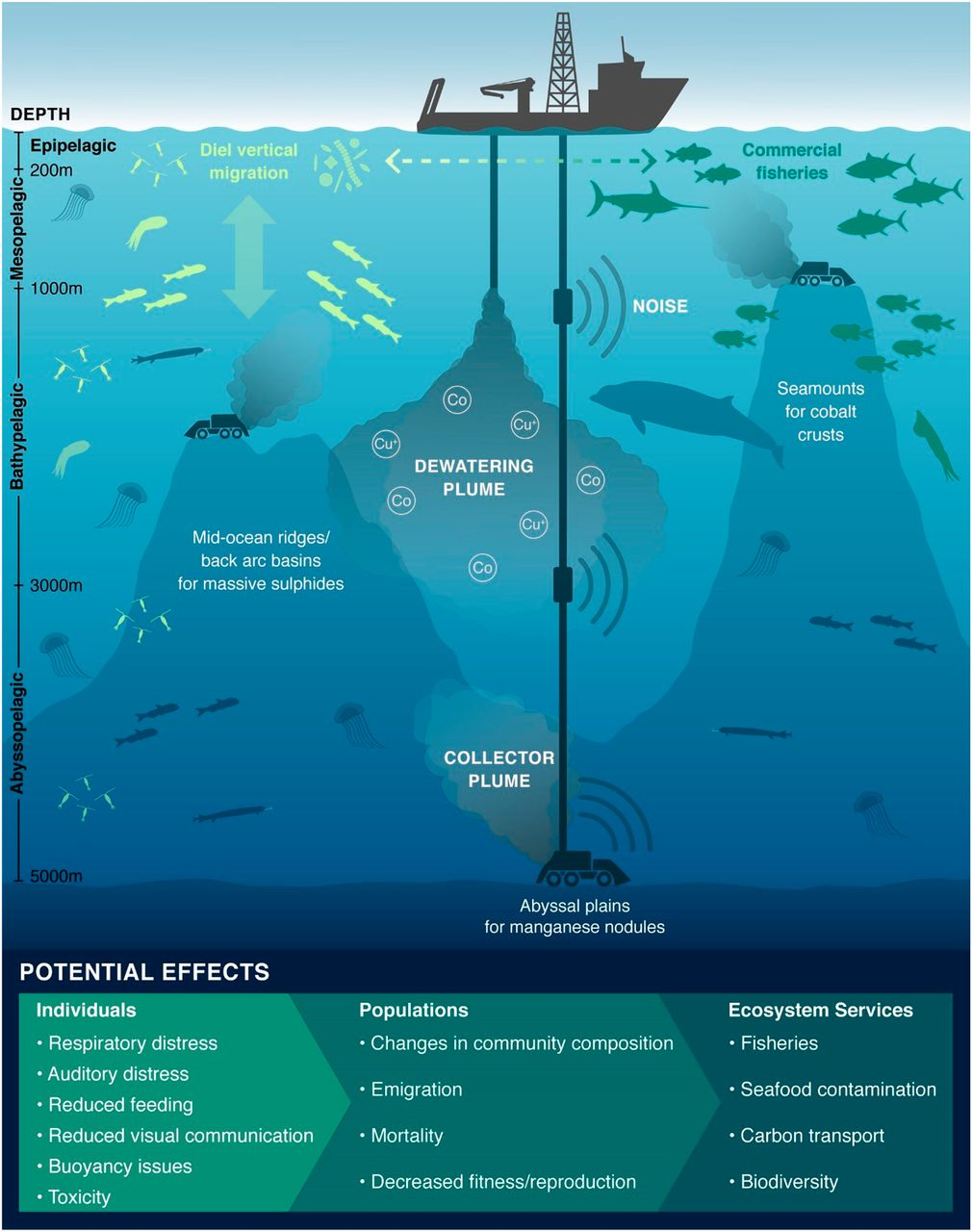Biodiversity & Environment
Deep Sea Mining
- 04 Jul 2023
- 6 min read
For Prelims: Deep Sea Mining, ISA, Green Energy, UNCLOS, Renewable Energy.
For Mains: Deep Sea Mining and Environment Concerns.
Why in News?
The International Seabed Authority (ISA) is preparing to allow Deep Sea Mining in the International Seabed, including mining for minerals needed for Green Energy.
- The ISA’s Legal and Technical Commission, which oversees the development of deep sea mining regulations, will meet in early July 2023 to discuss the mining code draft. The earliest that mining under ISA regulations could begin is 2026.
What is Deep Sea Mining?
- Deep sea mining involves removing mineral deposits and metals from the ocean’s seabed.
- There are three types of such mining,
- Taking deposit-rich polymetallic nodules off the ocean floor
- Mining massive seafloor sulfide deposits
- Stripping cobalt crusts from rock.
- These nodules, deposits and crusts contain materials, such as nickel, rare earths, cobalt and more, that are needed for batteries and other materials used in tapping Renewable Energy and also for everyday technology like cellphones and computers.
- Companies and governments view these as strategically important resources that will be needed as onshore reserves are depleted and demand continues to rise.
What are the Environmental Concerns related to Deep Sea Mining?
- Deep Sea Mining can damage the Marine Ecosystem and ecosystems. Damage from mining can include noise, vibration and light pollution, as well as possible leaks and spills of fuels and other chemicals used in the mining process.
- Sediment plumes from some mining processes are a major concern. Once valuable materials are extracted, slurry sediment plumes are sometimes pumped back into the sea. That can harm filter feeding species like corals and sponges and could smother or otherwise interfere with some creatures.
- Deep-sea mining would go beyond harming the seabed and have a wider impact on fish populations, marine mammals and the essential function of the deep-sea ecosystems in regulating the climate.
How is Deep Sea Mining Regulated?
- Countries manage their own maritime territory and exclusive economic zones, while the high seas and the international ocean floor are governed by the United Nations Convention on the Law of the Seas (UNCLOS).
- Under the treaty, the seabed and its mineral resources are considered the “common heritage of mankind” that must be managed in a way that protects the interests of humanity through the sharing of economic benefits, support for marine scientific research, and protecting marine environments.
What is the International Seabed Authority?
- About:
- The ISA is an autonomous organization within the United Nations common system, with headquarters located in Kingston, Jamaica.
- All States parties to the 1982 UNCLOS are members of the Authority, amounting to 168 members, including the European Union.
- The Authority is one of the three international institutions established by UNCLOS;
- The other two are the Commission on the Limits of the Continental Shelf and the International Tribunal for the Law of the Sea.
- The Authority is one of the three international institutions established by UNCLOS;
- Objective:
- Its primary function is to regulate exploration for, and exploitation of deep seabed minerals found in 'the Area', which is defined by the Convention as the seabed and subsoil beyond the limits of national jurisdiction, that is, beyond the outer limits of the continental shelf.
- The Area comprises just over 50 % of the entire seabed on Earth.
- Its primary function is to regulate exploration for, and exploitation of deep seabed minerals found in 'the Area', which is defined by the Convention as the seabed and subsoil beyond the limits of national jurisdiction, that is, beyond the outer limits of the continental shelf.
Way Forward
- Applications for mining must be considered and environmental impact assessments need to be carried out.
- In the meantime, some companies — such as Google, Samsung, BMW and others — have backed the World Wildlife Fund’s call to pledge to avoid using minerals that have been mined from the planet’s oceans.
- More than a dozen countries—including France, Germany and several Pacific Island nations— have officially called for a ban, pause or moratorium on deep sea mining at least until environmental safeguards are in place, although it’s unclear how many other countries support such mining.
UPSC Civil Services Examination, Previous Year Question (PYQ)
Q. Consider the following statements: (2021)
- The Global Ocean Commission grants licences for seabed exploration and mining in international waters.
- India has received licences for seabed mineral exploration in international waters
- ‘Rare earth minerals’ are present on the seafloor in international waters.
Which of the statements given above are correct?
(a) 1 and 2 only
(b) 2 and 3 only
(c) 1 and 3 only
(d) 1, 2 and 3
Ans: (b)
Mains
Q. Critically evaluate the various resources of the oceans which can be harnessed to meet the resource crisis in the world. (2014)







